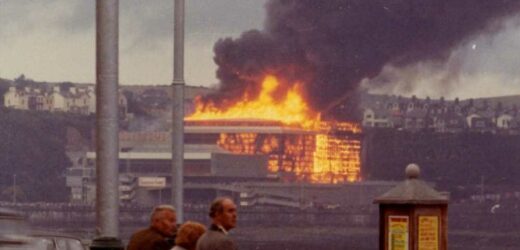WAVING off her parents and younger sister as they boarded a ferry to the Isle of Man, newlywed Heather Lea had no idea it would be the last time she'd see them.
Days later they – along with 47 others – perished when the popular Summerland leisure centre in the island's capital, Douglas, went up in flames on August 2, 1973.
The inferno, which killed 11 children and injured 100 people, was the worst peacetime loss of life in a fire since The Blitz.
Yet no criminal charges were ever brought, despite an inquiry finding a catalogue of shocking errors, and a verdict of 'death by misadventure' was given to those who died.
They include Heather's mum and dad Elizabeth and Richard Cheetham, 51, and 13-year-old sister June.
Heather, now 69, and husband Reg, 74, is backing a campaign calling on the Isle of Man Government to apologise, and a debate will be held today in the House of Commons ahead of the 50th anniversary of the tragedy.
Read More News Features
Inside the bitter row which could see remote British islands quit UK for Norway
I cried as I searched for my birth mother – it was tough, says Ellie Simmonds
The bereaved families argue had lessons been learned from the disaster, it could have prevented the Grenfell Tower blaze which killed 72.
Speaking to The Sun, Heather says the pain of losing her family aged 19 has "never gone away".
“It's always there in the back of your mind, all the ‘what ifs’,” Heather explains.
“You don't think about it every single minute of every day, but at Christmas, on birthdays, when our two daughters got married and got through university, I wonder what my mum and dad would have thought of them.
Most read in The Sun
Grealish's Wag Sasha Attwood breaks silence after star seen with air hostess
BBC 'sex pics' star had Insta chat with teen, 17 using love hearts & kisses
BBC 'sex claims star broke lockdown' to meet young stranger from dating site
I've met the woman of my dreams but the age-gap is raising eyebrows
 16
16 16
16“I'm sure they would have loved them. My little sister was just 13 when she passed away, and they never knew their aunt.
"June never had the opportunity to have a boyfriend or get married and have children. I often think about what her life would be like now. That's something that will never go away.
“When I heard about Grenfell, I felt angry and disgusted. How could they use another flammable material on this building, and on buildings all over the country, even now?
"Fifty people lost their lives and 100 more were injured but it's all been brushed under the carpet and nobody cares.”
Summerland was billed as 'Britain’s first forget the weather family fun centre' when it opened in 1971.
It was commissioned by the Manx Government to encourage tourists back to the island after cheap package holidays began to lure them away to sunnier European climes.
Local architect James Lomas came up with the idea of an all-weather attraction with Mediterranean temperatures.
Designed to mimic a sub-tropical holiday resort, the 250ft-long building with a 10,000 capacity housed a vast Solarium with trees and deckchairs and, initially, exotic birds – later removed after they ate the plastic leaves.
Entertainment spaces included a disco, fairground rides and a huge bouncy castle, plus a Sundome on level six where visitors could tan under UV lights.
Heather's family, from Kirkby, Liverpool looked forward to trips to Summerland during their annual fortnight holiday on the island, where they stayed at a guest house owned by a couple, Mr and Mrs Christian.
“They weren’t well off and it took 12 months to save up every time we went on holiday,” she recalls.
Heather had opted to stay behind and look after her grandmother that year, having just got married, but drove dad Richard, who served in the RAF, and mum Elizabeth to the boat.
"We got the cases out of the car, said goodbye and waved them off, telling them to have a good holiday. That was the last we saw of them," she says.
We got the cases out of the car, said goodbye and waved them off, telling them to have a good holiday. That was the last we saw of them
At 9.30pm on August 2, the newlyweds were watching TV when a report of an explosion at the Summerland complex came on the news, along with a number to call for anyone concerned about loved ones.
With no phone in the house, they rushed next door to use a neighbour’s, but were unable to get through.
They then phoned guest house owner Mrs Christian, who answered: “June, is that you?”
“I said ‘It's not June, it's Heather,’ and she apologised,” Heather recalls. “We knew at that point Mum and Dad had planned to go to Summerland that evening and we were filled with dread.
“I knew in my heart that, if my mum and dad had got out and were safe, the first thing they would do is contact me.
“I knew there was something drastically wrong and they weren't coming back.”
When they finally got through the following morning, their worst fears were confirmed – Richard, Elizabeth and June Cheetham were among those missing.
It took a further week to positively identify them, with grief-stricken Reg having to visit various dentists to track down Richard’s dental records.
“We eventually found one in Southport who gave me the identifying marks on Richard’s teeth,” he says. “But we already knew they were dead.”
Later they learned the horrifying details of the blaze – and the shocking failings that led to the catastrophic loss of life.
The fire started in a disused kiosk near the crazy golf area around 7:30pm, where three teenagers had been smoking and playing with matches.
Staff attempted to put it out by pouring water on it from above and using fire extinguishers.
But while they battled the local flames, they had no idea the blaze was already burning inside the cavity walls of the main building – later found to be packed with flammable materials.
The fire alarm system, which linked directly to nearby Douglas fire station, was not activated because the members of staff on duty didn’t know how to use it.
It wasn’t until 8.05pm that staff called the station, which had already received a radio message from a ship anchored in Douglas bay.
Sixteen fire engines and 93 firefighters battled the blaze, while hundreds of people tried to escape and a fireball ripped through the six floors, taking just 11 minutes to envelop the building.
One survivor, Jackie Hallam, then 13, who lost her mum and best friend, said her nylon tights melted to her legs while her skirt and hair burnt.
She passed out and woke surrounded by “people lying there, burning; bodies burning" before having to climb over them and jump from the sixth floor balcony.
A public enquiry, opened in September 1973, found a catalogue of errors.
The building was covered in an acrylic sheeting called Oroglas, 20 times stronger than glass, which could be moulded into different shapes to concentrate the sun.
More than 1,900 tinted panels were used on the roof and on one of the walls.
Jackie recalled flaming drops of Oroglas falling on her, and described it as "like raining fire".
In order to pass the use of the material – which caught fire rapidly in lab tests using a cigarette lighter – the architects had to get past a building regulation which required external walls to be noncombustible and have a fire resistance of two hours.
Lomas assured the authorities that the outer structure was an “acrylic glazed space frame, no part of which is combustible” and the bylaw was waived.
Sprinklers, which should have been installed as an extra precaution, were not.
The insurance company had also raised concerns about the open-plan design, numerous timber mezzanine floors, and an upper half “almost entirely constructed of acrylic sheets, which of course are combustible” – but were talked into accepting the risk by owners Trust House Forte.
Another fatal error was the use of Galbestos, plastic-coated steel sheeting used for the south-eastern wall, which Lomas preferred to concrete because it was cheaper.
Soundproofing on an internal wall was created with highly combustible material Decalin, meaning both materials were present in the 12in wall cavity – a deadly combination.
The public inquiry report ruled there were "no villains" but a combination of "human errors, a reliance on the old-boy network and poor communications" led to the disaster.
It returned a verdict of 50 deaths by “misadventure” – which the victims' families want overturned.
“Misadventure is when you walk across the road and get hit by a bus,” says Heather.
“This complex was supposed to be safe and secure for holidaymakers to go and enjoy their holidays safely.
"Now it would be classed as corporate manslaughter, so the verdict of misadventure is false. It's a lie.
“When that building was certified to be open, it was a death sentence. It was an accident waiting to happen.”
When that building was certified to be open, it was a death sentence. It was an accident waiting to happen
The three Liverpool boys who inadvertently started the fire were each fined £3 and ordered to pay 33p compensation and 15p costs for damaging the kiosk lock.
Reg blames Lomas – who spent seven weeks after the tragedy on his luxury yacht in the Mediterranean and claimed there had been “far too much hysteria” in the wake of the deaths.
He also believes the local authorities should have been held to account and claims the Manx Government has never offered an apology or “word of commiseration” to the victims and bereaved families.
“We don't want anyone punished. It's 50 years ago, and most of them are dead," he says.
“We just want them hold their hands up and apologise for what they've done to us as a family."
The couple also want the Summerland site, currently a derelict eyesore, to be cleared and repurposed.
Lasting pain
Eight days after the disaster, Heather and Reg received the official notice of her family’s deaths – from severe burning.
Two weeks later she received a suitcase of her parents’ belongings, including a cow-shaped jug they had bought as a holiday gift for the couple, and charred banknotes found in Richard’s pockets.
Floored by grief, Heather had to deal with emptying the family’s council house and arranging a memorial service for friends and family.
“That was awful,” she says. “Knowing that three had passed away, it didn’t feel possible.”
Although they weren’t born until several years later, the couple say the disaster affected their girls Jane and Vicky.
“We never talked about the fire,” says Heather. “Our friends, George and Jackie, knew I was sad about the children not knowing my parents and told us, 'As long as we're here your children will have grandparents'.
"It was only when they were in their teens the girls found out they weren't their real grandparents.
“They talked to Reg about it but they never mentioned it to me in case they upset me.”
Read More on The Sun
I was a BGT star – but a wrong move has left me a complete unknown
Warning to parents as deadly baby virus on the rise in the UK & Europe
Reg recalls an emotional conversation with Jane in the car, when she was in her twenties, after she’d started researching her family background and had been in touch with Dr Ian Phillips, who spent 20 years looking into the tragedy.
“She just started crying,” says Reg. “It took me aback because she missed the grandparents she'd never had. You don't realise how deep it affects you.”
Source: Read Full Article
























